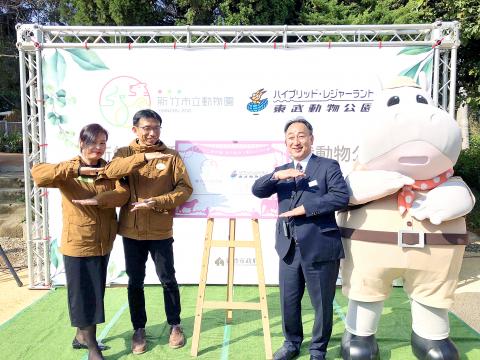Hsinchu Zoo and Tobu Zoo in Japan’s Saitama Prefecture on Tuesday established sister relations to cooperate on animal care and protection.
Hsinchu Deputy Mayor Shen Hui-hung (沈慧虹) said she hopes that through the agreement, Hsinchu Zoo would learn from the outstanding wildlife conservation efforts of Tobu Zoo.
The two zoos are to conduct regular exchanges on animal care and conservation, with the Hsinchu facility seeking to boost its soft power and upgrade its animal breeding expertise, she said at a ceremony in the city.

Photo: CNA
The agreement was signed by Hsinchu Zoo director Yang Chia-min (楊家民) and Tobu Zoo director Mitsuo Ban, and witnessed by Shen.
Hsinchu Zoo reopened last month after two years of renovations with a goal to be a facility for life education and animal protection.
Tobu Zoo, which opened in 1981 as the 80th anniversary project of Tobu Railway, is a popular hybrid theme park, comprising a zoo, an amusement park and swimming pools.
It has about 1,200 animals, with some allowed to be fed by visitors.
It is one of the few places where white tigers are displayed and has plans for an observatory area modeled on Hsinchu Zoo’s tropical rain forest gallery to allow people to see them close up, Yang said.
Tobu Zoo has the Heartful Garden, with 410 plant species that grow all year round, and the Palette Garden, which has flowers and fruit trees, including 3,000 Yoshino cherry trees, Ban said.

Alain Robert, known as the "French Spider-Man," praised Alex Honnold as exceptionally well-prepared after the US climber completed a free solo ascent of Taipei 101 yesterday. Robert said Honnold's ascent of the 508m-tall skyscraper in just more than one-and-a-half hours without using safety ropes or equipment was a remarkable achievement. "This is my life," he said in an interview conducted in French, adding that he liked the feeling of being "on the edge of danger." The 63-year-old Frenchman climbed Taipei 101 using ropes in December 2004, taking about four hours to reach the top. On a one-to-10 scale of difficulty, Robert said Taipei 101

Nipah virus infection is to be officially listed as a category 5 notifiable infectious disease in Taiwan in March, while clinical treatment guidelines are being formulated, the Centers for Disease Control (CDC) said yesterday. With Nipah infections being reported in other countries and considering its relatively high fatality rate, the centers on Jan. 16 announced that it would be listed as a notifiable infectious disease to bolster the nation’s systematic early warning system and increase public awareness, the CDC said. Bangladesh reported four fatal cases last year in separate districts, with three linked to raw date palm sap consumption, CDC Epidemic Intelligence

Two Taiwanese prosecutors were questioned by Chinese security personnel at their hotel during a trip to China’s Henan Province this month, the Mainland Affairs Council (MAC) said yesterday. The officers had personal information on the prosecutors, including “when they were assigned to their posts, their work locations and job titles,” MAC Deputy Minister and spokesman Liang Wen-chieh (梁文傑) said. On top of asking about their agencies and positions, the officers also questioned the prosecutors about the Cross-Strait Joint Crime-Fighting and Judicial Mutual Assistance Agreement, a pact that serves as the framework for Taiwan-China cooperation on combating crime and providing judicial assistance, Liang

US climber Alex Honnold left Taiwan this morning a day after completing a free-solo ascent of Taipei 101, a feat that drew cheers from onlookers and gained widespread international attention. Honnold yesterday scaled the 101-story skyscraper without a rope or safety harness. The climb — the highest urban free-solo ascent ever attempted — took just more than 90 minutes and was streamed live on Netflix. It was covered by major international news outlets including CNN, the New York Times, the Guardian and the Wall Street Journal. As Honnold prepared to leave Taiwan today, he attracted a crowd when he and his wife, Sanni,